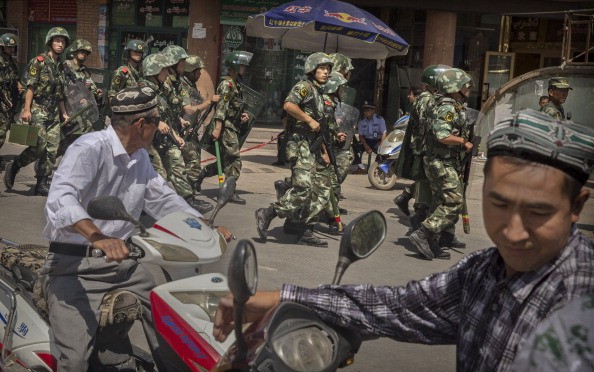Chinese government watchdogs in the Xinjiang Uyghur Autonomous Region have been clamping down on online audio and video content related to terrorism in the past year, as part of a campaign to combat extremism and maintain security in the troubled region.
Luo Fuyong, director of the Xinjiang Internet Information Office, said that his office has been looking for different ways to counter extremist activity online and has launched several campaigns to remove terrorist content online, according to a report by the Global Times published Thursday.
Xinjiang has seen a spite of terrorist attacks in recent years, including bombs thrown at police cars and civilians run over with vehicles. In 2014, police busted a total of 181 terror groups in the region.
With Xinjiang as the frontier in the fight against separatism and terrorism, the Internet is the "the main battleground for ideological struggles," Luo said.
Luo credited online audio and video promoting terrorism as the major cause of terrorist attacks, adding that since June 2014, China's central government has launched several special campaigns to curb online terrorist content and severely punish individuals who release, spread or store terrorist material.
In March 2014, the Xinjiang government issued a notice forbidding the circulation of video and audio content promoting terrorism in a bid to control the growing number of attacks on police and civilians.
The notice bans the use of mobile phones, computers and portable storage devices to create, send, play, copy, transfer or store such types of content. Anyone possessing such content must delete or destroy them or submit to the authorities within a month after the notice was issued.
The regulation was enacted in response to claims of Xinjiang police that, in recent years, terrorists were often inspired by audio and video of foreign terrorist activities.
Of the five terrorist attacks that took place in Xinjiang in 2014, most were caused by individuals radicalized by watching videos of terrorist activities, the police said.
Luo said that his office has also been seeking ways to combat extremism outside of the Internet.
In 2014, around 6,000 cultural activities and 20,000 videos were shown to tell the stories of "40,000 models," the Global Times said in its report.
Previous media reports have also cited authorities distributing brochures in Xinjiang describing extreme religious activities and the behavior of extremists and instructing citizens to report such activities to the police.
Xinjiang's authorities have also created an online platform to receive tips and offer rewards to whistleblowers in 14 cities and prefectures across the region. As of the end 2015, the platform has received over 500,000 reports.
Officials also note that many people involved in online crimes are poorly educated and unemployed, and that by spreading extreme religious ideas they have gained thousands of adherents.
In Dec. 2014, Xinjiang police arrested two suspects for spreading rumors about a terrorist attack in Shache County in Kashgar prefecture.



























